Israel at war: What happened on Day 38?
1,200 Israelis murdered since October 7, including 363 soldiers • 239 held hostage by Hamas, four hostages released, one rescued
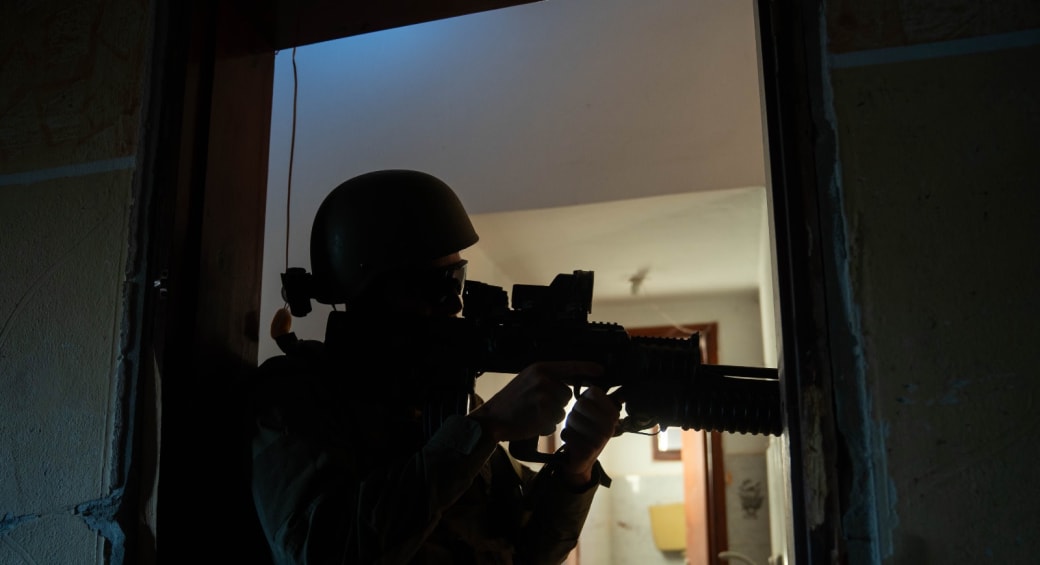

Read our latest live blog for Day 40 of the Swords of Iron War

Cape Town pro-Israel rally attacked by pro-Palestinian protesters
An anti-Israel protester carrying a gun threatened to shoot one of the pro-Israel protesters, according to a participant.
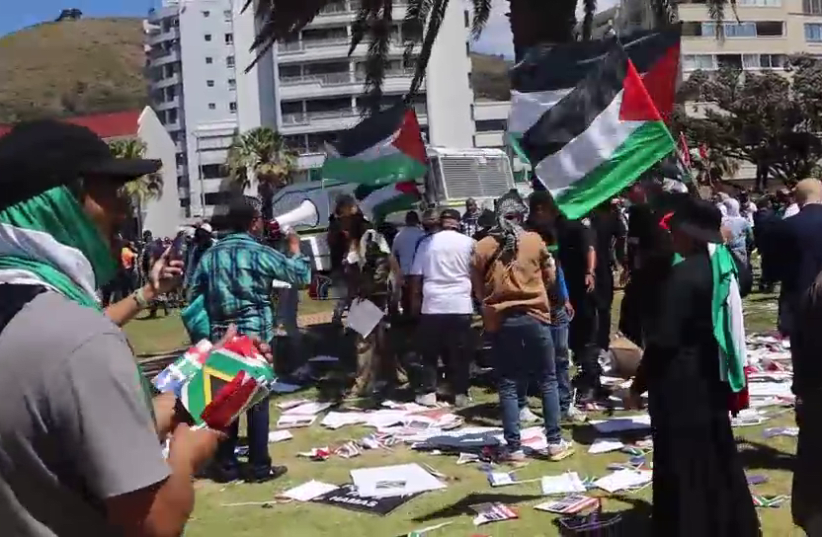
A prayer meeting in support of Israel in Cape Town, South Africa was canceled on Sunday, after pro-Palestinian protesters attacked and threatened pro-Israel demonstrators with guns and knives, according to South African media.
The International Christian Embassy Jerusalem (ICEJ) branch in South Africa helped organize the prayer rally, saying about 3,000 Christians and some Jews were expected to attend before police ordered them to call off the rally. The ICEJ stated that Mandla Mandela, Nelson Mandela's grandson, was one of the main inciters of the violence on Sunday.
Reports from participants at the event said that one Messianic Jewish man had his finger broken when anti-Israel protesters tried to rip away his flag, and another anti-Israel protester carrying a gun threatened to shoot another participant. One other man was slightly wounded by someone carrying a knife as well, according to the participant.
According to the Ground Up news agency, the pro-Palestinian protesters showed up at the Sea Point Promenade before the pro-Israel protest officially began and started clashing with police at the scene. Buses which were set to bring more pro-Israel protesters to the site were turned back as police used stun grenades and water cannons to disperse the violence.
The violence escalated when a pro-Palestinian protester attempted to steal an Israeli flag from a pro-Israel protester. One photo from the scene showed pro-Palestinian protesters surrounding and harassing a pro-Israel protester in a wheelchair, according to the report. The two sides reportedly shouted at each other as well.
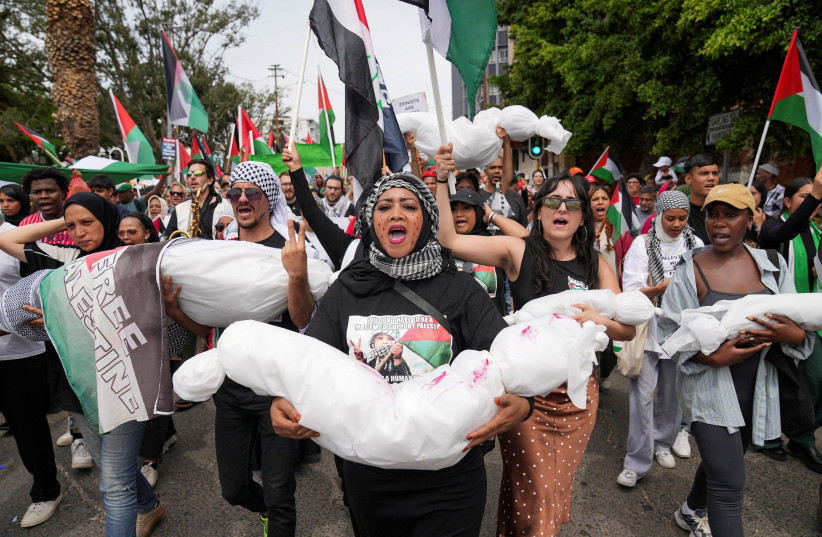
According to the South African Friends of Israel, some of the pro-Palestinian protesters were seen waving ISIS flags as well.
ICEJ: They were seeking out who was Jewish
“It was very shocking to see the level of threats and violence today,” said ICEJ-South Africa national director Vivienne Myburgh. “They were seeking out who was Jewish. It is rare to see that sort of hatred and threats here, but they are emboldened by the position of the ANC government. The local Jewish community is very rattled.”
Abeedah Adams, a member of the Palestinian Solidarity Campaign (PSC), told Ground Up that the protest on Sunday was not organized by their organization, saying "It was more spontaneous: people responding to the posters and the media about the pro-Israeli protest. I think there’s a very strong sentiment that we can’t allow that kind of Zionism. It’s not welcome in the City of Cape Town."
The South African Jewish Board of Deputies condemned the violence on Sunday, posting on Facebook "In a constitutional democracy people are permitted the right to protest. Depriving the Christian Zionists the right to protest in Sea Point today does not make the Hamas supporters activists, it makes them criminals and thugs."
Cape Town Mayor Geordin Hill-Lewis condemned the violence on Sunday, stating that while up until Sunday anti- and pro-Israel protests had remained peaceful, violent disruptions targeted the planned peaceful prayer gathering in support of Israel.
"This violence deserves the condemnation of all Capetonians who value free expression in our open democracy," wrote Hill-Lewis. "Every person or group, of every belief and persuasion, has the right to protest peacefully in South Africa. That right is Constitutionally protected, and for good reason, because in South Africa's past certain protests were banned or violently suppressed, and opinions censored."
The mayor additionally condemned any hate speech uttered at protests, noting that he had received video showing a representative of the Pan Africanist Congress (PAC) calling young Jewish children in Cape Town "murderers."
At a pro-Palestinian protest on Saturday, the PAC representative stated "We know where the murderers come from, they come from Herzlia (a local Jewish school), here in Cape Town.”
"Such hateful language should be similarly condemned by all. Radical elements do not speak for Capetonians, and do not even speak for the protesters they claim to represent," wrote Hill-Lewis.
According to the mayor, the South African Police Service seized two firearms and arrested seven people amid the clashes.
Go to the full article >>US airstrikes target Iranian militias in eastern Syria as tensions escalate
The strikes targeted a training facility and a safe house near the cities of al-Bukamal and al-Mayadeen.
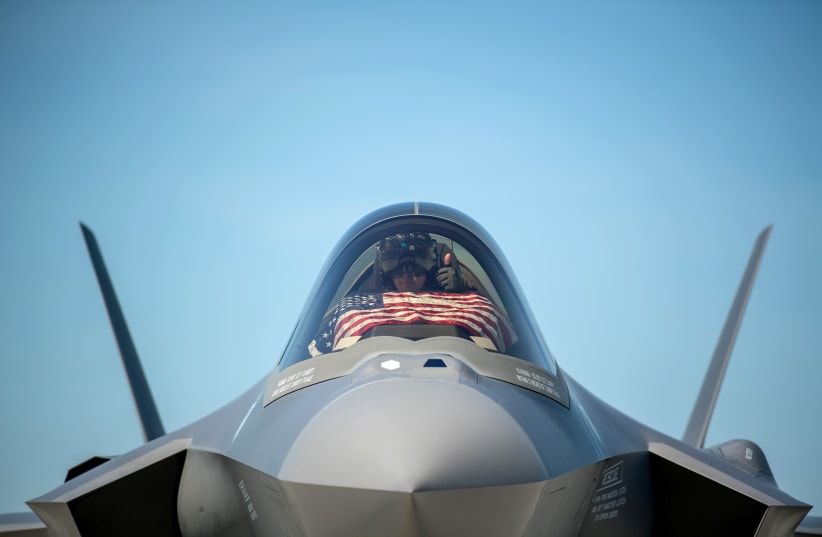
US airstrikes targeted sites belonging to Iran's Islamic Revolutionary Guard Corps (IRGC) and Iran-backed militias in the Deir Ezzor region of eastern Syria on Sunday night, according to US Defense Secretary Lloyd Austin.
The strikes targeted a training facility and a safe house near the cities of al-Bukamal and al-Mayadeen, according to Austin.
"The President has no higher priority than the safety of US personnel, and he directed today's action to make clear that the United States will defend itself, its personnel, and its interests," said the defense secretary.
US Central Command (USCENTOM) Commander Gen. Michael Erik Kurilla, referenced the strikes as well on Sunday night, stating "Today, in response to continued provocations by Iran’s Islamic Revolutionary Guard Corps and their affiliated groups in Iraq and Syria, USCENTOM conducted air strikes against facilities near the cities of al-Bukamal and al-Mayadeen. The United States will continue to defend itself, its personnel, and its interests.”
Al-Mayadeen TV, affiliated with Iran's "Axis of Resistance," reported that at least one person was killed and another was wounded in a strike near al-Mayadeen in Deir Ezzor.
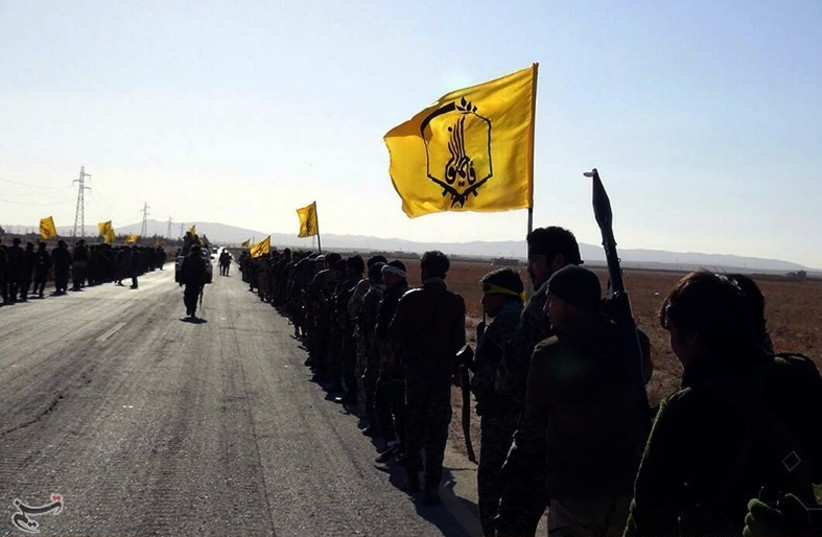
Iranian proxies have a heavy presence in the Deir Ezzor region, located along the Syrian-Iraqi border. A number of crossings are used in the area by Iran to transfer weapons from Iraq to Hezbollah and other proxies in Syria and Lebanon.
The New York Times reported on Sunday that despite the escalation in attacks by Iranian proxies, President Joe Biden has rejected more aggressive bombing options proposed by the Pentagon out of fear of provoking a larger conflict with Iran.
Rocket and drone strikes target US forces in Iraq, Syria
The strikes on Sunday night came after continued rocket and drone attacks against US forces in Syria and Iraq in recent weeks. Since Hamas launched the war with Israel on October 7, Iranian proxies have escalated their attacks on bases housing US forces throughout the region.
Shortly after the strikes on Sunday night, Iranian proxies launched rockets toward a base housing US forces in the al-Omar oil field in eastern Syria, according to Al-Mayadeen TV and local media. According to Al-Mayadeen TV, 15 rockets were fired toward the base in the al-Omar field.
Iran-backed proxies in Iraq said early Monday morning that they had targeted US forces in the Green Village in Deir Ezzor with a drone overnight.
Last Wednesday, the US struck a weapons storage facility used by the IRGC and Iran-backed militias in the Deir Ezzor region. The Syrian Sada AlSharqieh news outlet reported that deaths and injuries were caused in the airstrike and that it targeted a site near the Deir Ezzor military airport.
Go to the full article >>Gaza's Al Shifa hospital no longer functions as a hospital - WHO's Tedros

The World Health Organization (WHO) has managed to restore communication with health professionals at the Al Shifa hospital in northern Gaza, WHO Director-General Tedros Adhanom Ghebreyesus said on Sunday.
"Regrettably, the hospital is not functioning as a hospital anymore," he added in a post on X, formerly known as Twitter.
WHO lost communication on Saturday and the health ministry in Hamas-controlled Gaza said that operations at the Al Shifa hospital complex, the largest in the Palestinian enclave, were suspended after it ran out of fuel.
Go to the full article >>Netanyahu: Israel at risk of losing right to self-defense against terror
US President Joe Biden speaks with Qatar’s emir on Gaza war, National Security Advisor Sullivan says hostage talks continue.

Israel risks losing its right to self-defense against terrorism if it is barred from attacking Hamas targets hidden behind civilians, Prime Minister Benjamin Netanyahu warned as the IDF prepared to enter military bunkers in Gaza hidden under Shifa Hospital.
“We have to win,” Netanyahu told NBC’s Meet the Press on Sunday morning, as he argued that those who protest on Hamas’s behalf are backing a force that is “pure evil” and the “new Nazis.”
“It’s like in World War II, the Allies are fighting the Nazis, they have invaded France after they were attacked by the Nazis and civilians are killed. Do you protest against the Nazis or do you protest against the Allies,” he asked.
“If we lose the moral clarity of supporting the force [Israel] that is fighting the terrorists [Hamas] that are hiding behind civilians and blaming the victims for these attacks, the victims who take the just action to defend themselves we will never be able to fight the terrorists,” Netanyahu said.
“They [Hamas] will always hide behind civilians and we will never able to fight them,” he said.
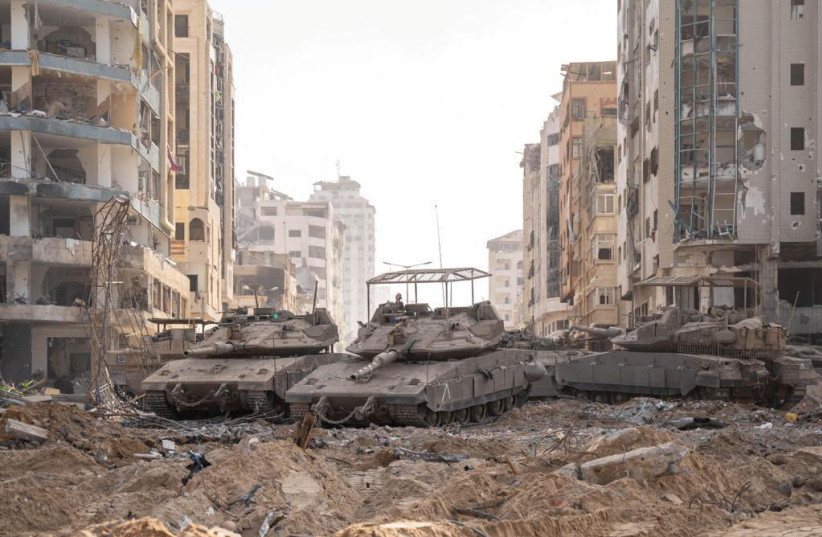
“We don’t want to make human shields as an effective strategy for terrorists,” he said.
Netanyahu spoke to NBC and CNN as the international community has increased its protest against Israel’s war in Gaza.
US President Joe Biden called Qatar's Emir Sheikh Tamim bin Hamad Al Thani to discuss developments in Gaza, the Amiri Diwan - the main seat of government in Qatar - reported on Sunday.
During the call, Al Thani stressed the need for an immediate ceasefire in Gaza and the permanent opening of the Rafah crossing into Egypt.
US Secretary of State Antony Blinken spoke by phone with Qatar Prime Minister Mohammed bin Abdulrahman Al Thani on Saturday.
US and Qatari officials have discussed humanitarian aid to Gaza as well as the issue of the hostages amid continued reports of a possible deal for their release even as Hamas has stated that such efforts have been halted.
US National Security Advisor Jake Sullivan told ABC that such talks were ongoing. Qatar has been one of the primary mediators for any such deal.
Netanyahu told NBC that Israel was doing everything in its power not to target civilians, whereas Hamas as done everything to possible to harm both civilians living in Gaza and Israel, Netanyahu stated.
He spoke as Hamas asserted that over 11,000 Palestinians have been killed in Gaza war-related violence since the terror group attacked Israel on October 7, killing over 1,200 people and seized more than 239 hostages.
Palestinian Authority President Mahmoud Abbas has accused Israelis of genocide in Gaza, while UN Secretary-General Antonio Guterres accused it of executing collective punishment against the Palestinians.
"You cannot use the horrific things that Hamas did as a reason for collective punishment of the Palestinian people," Guterres told CNN in an interview, adding that 101 UN personnel have died so far in the war.
“We have witnessed unrelenting bombardment and a dramatic number of civilian casualties,” Guterres stated.
Pope Francis on Sunday reiterated his plea for an end to hostilities and called for "much more" humanitarian aid for Gaza.
"Enough, enough brothers, enough," Francis said, adding the wounded in the Gaza Strip needed to be taken care of immediately and the protection of civilians assured. He also said hostages held by Hamas must be freed.
Addressing the crowds in St Peter's Square after his weekly Angelus prayers, Francis said arms would never bring peace and that the conflict must not widen.
"I am close to all those who suffer, Palestinians and Israelis," he said, adding he was praying for them.
Sullivan told CBS that Israel had a right to defend itself with a military campaign to oust Hamas, even as he expressed concerns about its impact on Palestinian civilians.
“Hamas is using hospitals, as it uses many other civilian facilities, for command and control, for weapons storage, to house its fighters. And this is a violation of the laws of war,” Sullivan said.
“That being said... the United States does not want to see firefights in hospitals, where innocent people, patients receiving medical care, are caught in the crossfire, and we've had active consultations with the Israeli Defense Forces on this,” Sullivan stated.
European officials rise to Israel's defense
British Defence Secretary Grant Shapps rose to Israel’s defense in an interview with the BBC on Sunday.
“If Britain had been subject to an attack of terrorists coming and murdering [1,200] people and cutting off heads, and we knew where those terrorists had gone, no one would say to Britain stop going after them,” Shapps said.
French President Emmanuel Macron made waves on Friday when he told the same network that Israel has no justification for such a high death toll in the Gaza war.
“De facto today [Palestinian] civilians are bombed. De facto, babies, ladies, old people are bombed and killed. There is no reason for that and no legitimacy, so we do urge Israel to stop,” Macron stated as he called for a ceasefire.
Neither Macron or Schapps answers direct questions as to whether Israel’s actions fell within the bounds of international law, stating only that Israel must abide by that law.
Schapps, however, said that it was important to note that Israel was taking steps to prevent civilian deaths and that its actions must be placed within the larger context of how nations act in wartime.
He compared the IDF aerial bombings of Gaza, with the British and American bombing of the German city of Dresden during World War II.
“We have sort of forgotten that in war, very sadly people lose their lives. When Britain bombed Dresden 35,000 people lost their lives,” Schapps said.
“When you have an organization like Hamas hiding and shielding itself with and under the civilian population [in Gaza] it’s a sad fact that some people will lose their lives.”
He noted that Israel was pursuing terrorists within the tunnels they were operating in and in which thousands of rockets were stored.
“How can we ask Israel not to go and destroy those bunkers,” Schapps asked.
“The answer is for Hamas to stop using those people [Palestinian civilians] as human shields and [it should] release the over 200 hostages” it seized on October 7.
“By the way some of them [the hostages] are Brits,” Schapps said.
In this war, Great Britain “should absolutely be on the side of right, and right is going after Hamas,” he stressed.
Reuters contributed to this report
Go to the full article >>Hezbollah's alarming weapon testing is expanding from several arenas
It is better for the IDF to leave all these and focus on the very difficult fighting that is still expected in Gaza.
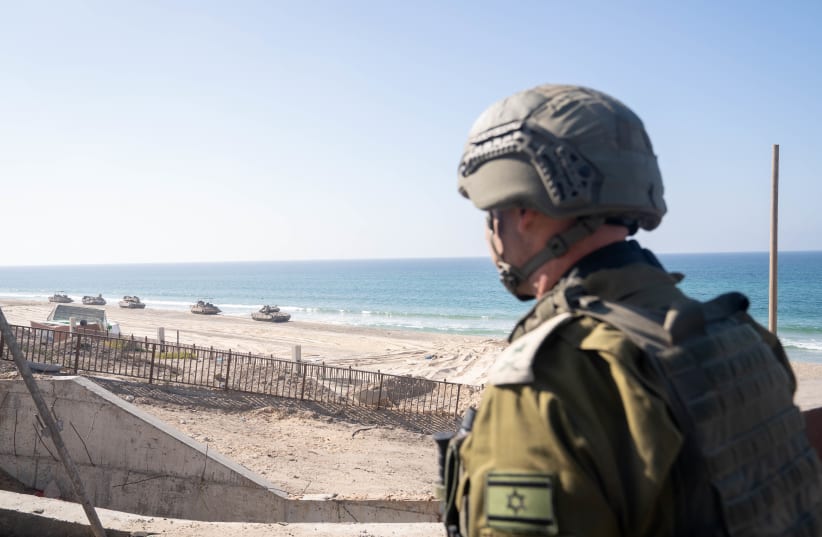
While the IDF is fighting in the Gaza Strip, Hezbollah is working to identify the weak points of Israel's air defense systems. This means that during a war, the drone threat is expected to be significant for Israel on several fronts.
The IDF announces that the war in Gaza will last for many months, while the American administration begins to move uncomfortably and hints at a few weeks.
French President Emmanuel Macron criticized Israel for killing children and women in Gaza and announced that he supports a ceasefire - a line that the American administration may also adopt.
All this while in the background, according to foreign publications, negotiations are progressing for a deal to release 100 children and women.
In the Gaza Strip, the IDF continues to increase the pressure around the Shifa Hospital, which has become the symbol of the battle for the city. In the coming days, the fighting in the Gaza Strip is expected to expand to other areas.
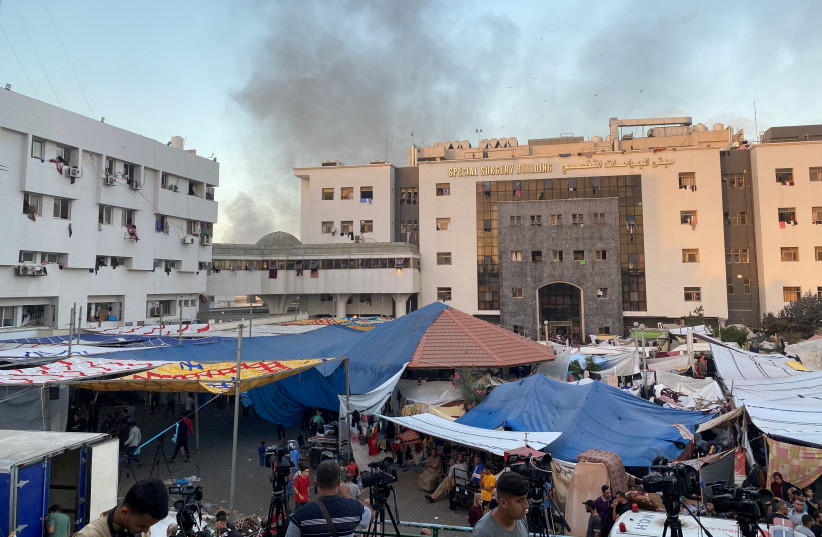
At the same time, the escalation continues in the North, and the exchange of blows over the weekend between Israel and Hezbollah expresses a growing possibility of increasing the intensity of the direct confrontation between the two parties with the intent that it will lead to the expansion of the conflict (which mostly took place at a depth of a few kilometers on both sides of the border).
Hezbollah's announcement at the end of last week that as a result of the airstrikes in Syria seven of its operatives were killed, is to a large extent a form of taking indirect responsibility for the launch of the suicide drone that hit the Tzeelim school in Eilat.
This came after the IDF announced that they attacked the group responsible for launching the drone toward Israel's Sunshine City.
Even if the Iranian Imam Hussein Brigade is involved in the operation, Hezbollah likely wanted to take sole responsibility for it. The launching of the three drones together towards Israel last weekend also expresses a trend of escalation.
Besides the drone that exploded on a military post and severely wounded an IDF soldier, one of the drones exploded in the Galilee Panhandle - this is in addition to the fact that Hezbollah also continues to launch the short-range Burkan rockets with a warhead of hundreds of kilograms, up to half a ton.
Seizing the advantage
On the other hand, the Air Force also took advantage of opportunities. After Hezbollah's attempts to fire air defense missiles at Air Force drones, a truck from which the missiles were launched was attacked in the Zahrani River area, about 40 km north of the border.
With each attack, Israel seeks to damage Hezbollah's air defense systems, also with a future view of increasing the freedom of action over the skies of Lebanon. The assessment in Israel is that depending on the pace of handling by the IDF of the hospitals in Gaza, Hezbollah's rocket fire is expected to expand to more distant areas - and hence the path to a more significant escalation may be very short.
Meanwhile, it seems that Hezbollah is also using the time to test the tools of its drones, in order to identify the weak points of Israel's air defense systems. This means that in wartime, the drone threat is expected to be significant for Israel - also from the fact that it is a foreseeable threat from several arenas at the same time.
Torn between a ceasefire and an agreement to return some of the abductees home
If indeed this time the Qataris manage to put on the table a deal for the partial return of abductees, there may be a dispute about this even within our limited cabinet.
The very senior commentator at the Washington Post, David Ignatius, reported after the meeting over the weekend in Doha, the capital of Qatar, between the head of the Mossad and the head of the CIA with the local prime minister that a proposal was put on the table to release 100 kidnapped Israeli children and women in exchange for 100 Palestinian boys and women, who are in the security prisons.
This seems a good deal for Israel, except that behind it apparently hides a demand for a ceasefire in which Hamas is very interested and Israel is much less interested.
This is with the understanding that any cease-fire may subsequently make it difficult to resume fighting when already meeting the goals of the war (to dismantle the military and governmental capabilities of Hamas and return the kidnapped back home) is considered a particularly complex challenge to achieve, when Israel is required to deal militarily with Hezbollah and additional threats from other fronts.
Back in the Gaza Strip, IDF forces are a few hundred meters from Shifa Hospital. It is important for Israel to fight for the narrative that through the occupation of the hospital, which was used as a city of refuge for senior Hamas officials to conduct the fighting from bunkers and situation rooms below, it will be possible to present to the world the cynical use that Hamas makes of the population in Gaza.
On the other hand, the crisis surrounding the hospital is an opportunity for Hamas to increase international pressure and criticism of Israel in the world. It may also encourage violent events against Jews in the world, and drag Hezbollah to increase the intensity of military activity against Israel.
In Gaza City, the IDF continued to establish control over many neighborhoods, while at the end of the week, we paid a heavy price with five IDF fighters who fell in battle. As we already wrote in the first two weeks of the ground maneuver, the IDF proved that it has a functioning ground army and reserve system.
The joint work of the brigades in the field with the Air Force is at a high level and advanced even in relation to other advanced armies in the world. Compared to the failure on October 7 and the serious intelligence failures, the tactical intelligence that is now available to commanders in the field is an information revolution compared to the past.
In order to continue the success of the activity at the tactical level, the IDF will be required to continuously attack and maneuver in the Strip, while it is absolutely clear that the passing of time does not play a positive role for Israel.
Hence the large gap between the sense of success of the forces in the field and the big questions - does the operation - however good it may be - bring Israel closer to meeting the big goals of defeating Hamas and returning the abductees?
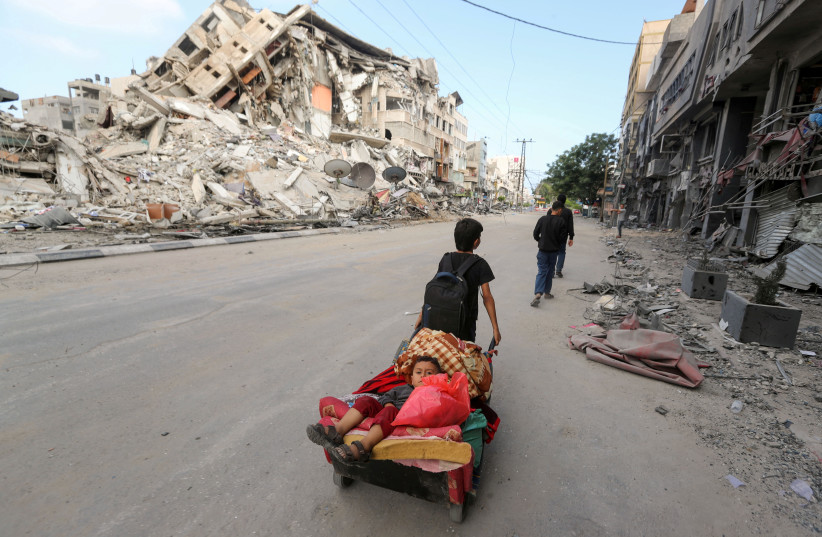
The IDF talks about long months but divides the campaign into phases - after the operation in Gaza City and other places, the intention is to operate for a long period of time at a slightly lower intensity in a Guardian-of-the-Walls-style operation model, with raids and spot operations until Hamas is defeated and the objectives of the operation are met.
It seems that for the IDF at least, there is no time limit in the state of war we are in. However, it is not clear if this position takes into account the wishes and interests of the American administration, which will know how to mark a stopping point for us if they decide so in Washington.
In a multi-arena campaign with global consequences, a successful operation by the IDF from a military point of view does not guarantee anything in regards to meeting the operation's goals, but it is clear that without success on the battlefield - meeting the goals is impossible.
The IDF managed to penetrate the defense lines of Hamas and reach the heart of Gaza City in an admirable manner, one that very few Western armies were able to do at the rate of progress and the extent of casualties, which until this stage and only relatively speaking, was low.
However, the threat of the tunnels, as manifested in the serious incident in which four fighters fell as a result of a booby-trapped tunnel entrance, illustrates the IDF's next threat - Hamas is expected to move from conducting a defensive battle based on its battalions, which have meanwhile been damaged, to guerrilla warfare in smaller settings.
The articles of the weekend left me with uncomfortable feelings: following the forces and leveraging psychological achievements for our public, and also for the other side, are important, but there is also a fine line between this and arrogance and dangerous complacency.
There is no doubt that the articles give a sense of important pride to the people, who have gone through a difficult period with a feeling that borders on national humiliation - but when a logistical axis paved in the north of the Gaza Strip is presented by an officer in the field as the Ayalon highway in Tel Aviv, it is disturbing even if it is only an image for the purpose of an article and communication.
Statements by commanders regarding Hamas terrorists as "tired and exhausted mutts" are troubling, and the ceremonies of raising the Israeli flags on the Gaza coast are also troubling, that all they lack to be seen as a parade of flags in officer training school are the trainees around them.
It is better for the IDF to leave all these and focus on the very difficult fighting that is still expected in Gaza against an enemy, for whom his survival is his victory - even when all around him is a city that has already changed its face forever.
Go to the full article >>DC Israel march American Jews' moment to rise to the occasion - comment
There has never been a time in recent memory in which American support for Israel has been more critical.
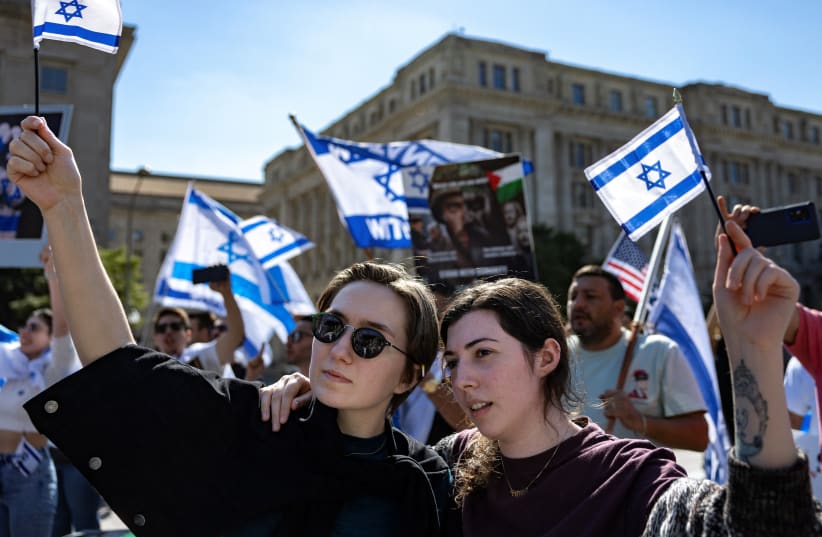
On Tuesday, Jews and their allies from across America will flock to Washington, DC, to participate in what promises to be one of the largest pro-Israel gatherings in recent memory.
Jewish schools have canceled classes, communities have chartered planes and major cities have virtually run out of coach buses.
The Conference of Presidents of Major American Jewish Organizations, and the Jewish Federation of North America (JFNA), which are jointly organizing the March for Israel, have called on Americans from all walks of life to attend the event, which will take place on the American capital’s iconic National Mall.
“Hamas’s brutal and ongoing acts of terror have no place in a civilized world, and directly undermine global efforts to seek just and lasting peace in the Middle East,” said Conference of Presidents CEO William Daroff. “It’s imperative that America sends a resounding message of support to our ally that we stand in solidarity with the victims, hostages, and their families; that we reject extreme anti-Israel rhetoric and sentiment; and that we are united around shared values of peace, justice, and freedom.”
“Americans have rightly stood by Israel at this critical moment because Americans understand that Israel’s fight against Hamas is no different than America’s fight against al-Qaeda and ISIS,” said JFNA CEO Eric Fingerhut.
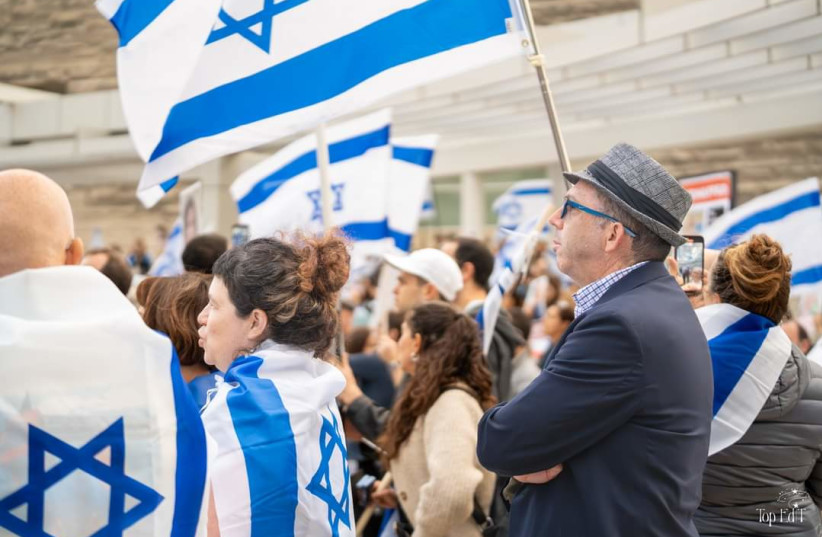
“As patriotic Americans, we will gather on the National Mall to ensure that the entire world knows that America supports the people of Israel in its time of need, that America demands the release of the remaining hostages, and that America categorically rejects antisemitism and hate in every form. This is a moment where all of us must stand against terror and defend what the terrorists seek to destroy.”
They’re right.
Israel has no greater or more important ally than America and Americans remain staunchly supportive of the Jewish state. Public opinion polls show that Americans stand with Israel and back its military campaign against Hamas in the aftermath of the October 7 massacre. They also back the steadfast support President Joe Biden and his administration have extended Israel at this most challenging time.
American Jews have been a driving force behind America’s support for Israel since before the Jewish state’s creation and they remain so today. A relationship with Israel is a core part of contemporary Jewish identity, and engaging with Israel is inherent to American Jewish life. American Jews give generously to Israeli causes, fly Israeli flags in their synagogues and communal institutions, sing “Hatikvah” at their gatherings, send their children to learn about and visit the Jewish state, and advocate for a strong US-Israel relationship. It is impossible to imagine Jewish life in America without Israel at its center.
Why this rally is so significant
There has never been a time in recent memory in which American support for Israel has been more critical. As we in Israel mourn our dead and tend to our wounded, as we are wracked with anxiety over the fate of our loved ones held by Hamas in Gaza, as we await word from our soldiers fighting on the frontlines, and as we witness the surge of hate directed at us around the world, we know we are not alone because you stand with us.
Our message to American Jews and their allies is simple: Go to Washington and march.
March in support of our homeland. March to demand the release of the hostages in Gaza. March against antisemitism in all its forms, including anti-Zionism.
Now is a time for unity. We derive our strength from one another and from our sense of community and peoplehood. Coming together in Washington gives tangible expression to the term “Clal Yisrael” – the Jewish people – and it offers our allies in other faiths and ethnic groups the chance to show that they stand by our side in our time of need.
There are moments in life when one must stand up and be counted. This is such a moment.
For the future of Israel, for the future of the Jewish people, for the future of the US-Israel relationship, and for the future of the values we share – go march, America.
Go to the full article >>Israel-Hamas War: What you need to know
- Hamas launched a barrage of rockets on October 7, with thousands of terrorists infiltrating from the Gaza border
- Over 1,200 Israelis and foreign nationals were murdered as of Tuesday afternoon, and more than 5,431 were wounded according to the Health Ministry
- IDF: 239 families of Israeli captives in Gaza have been contacted, 30 of them children